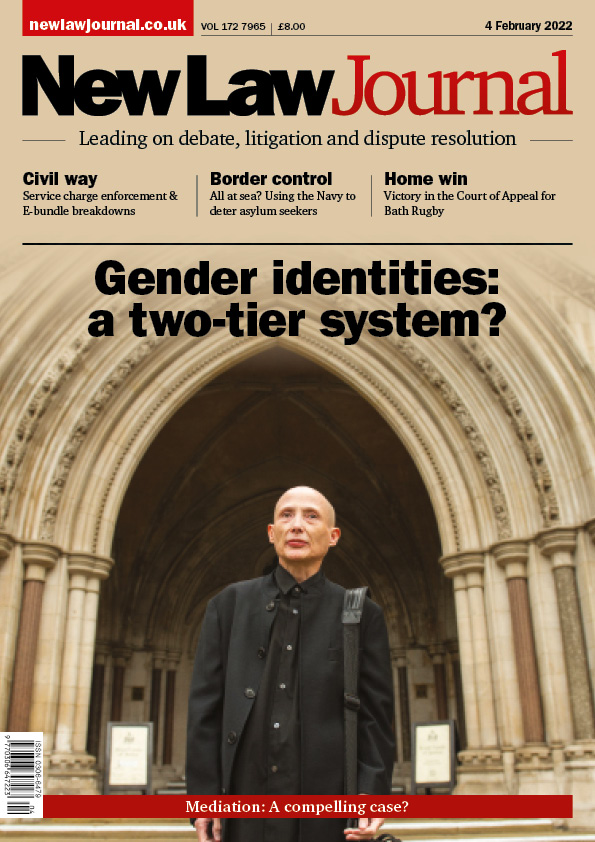THIS ISSUE

Neil Parpworth looks at current Downing Street shenanigans through the lens of a previous legal challenge
An alternative approach to joint expert statements could deliver a far more useful tool for judges, as Jessica Resch, Tim Giles & Maja Glowka explain
Elan-Cane: has the Supreme Court created an imbalance in rights protection between binary & non-binary genders? Jack Castle & Oscar Davies examine the ruling
William Gibson recounts some heated moments from the world of costs
Victory in the Court of Appeal: Andrew Francis tackles the enforceability of covenants
With the judiciary’s increasing willingness to be flexible on compulsory ADR, Paul Dorrans & Camilla Pratt look ahead to what may come next
Elspeth Guild & Rebecca Niblock cast doubt on government plans to use the Navy to deter asylum seekers
Divorce rules out; Service charge enforcement; E-bundle breakdowns; 167 out of 1793 may do
John McMullen presents a round-up of the latest cases on TUPE transfers
MOVERS & SHAKERS

Jackson Lees Group—Jannina Barker, Laura Beattie & Catherine McCrindle
Firm promotes senior associate and team leader as wills, trusts and probate team expands

Asserson—Michael Francos-Downs
Manchester real estate finance practice welcomes legal director

McCarthy Denning—Harvey Knight & Martin Sandler
Financial services and regulatory offering boosted by partner hires
NEWS
Holiday lets may promise easy returns, but restrictive covenants can swiftly scupper plans. Writing in NLJ this week, Andrew Francis of Serle Court recounts how covenants limiting use to a ‘private dwelling house’ or ‘private residence’ have repeatedly defeated short-term letting schemes
Artificial intelligence (AI) is already embedded in the civil courts, but regulation lags behind practice. Writing in NLJ this week, Ben Roe of Baker McKenzie charts a landscape where AI assists with transcription, case management and document handling, yet raises acute concerns over evidence, advocacy and even judgment-writing
The Supreme Court has drawn a firm line under branding creativity in regulated markets. In Dairy UK Ltd v Oatly AB, it ruled that Oatly’s ‘post-milk generation’ trade mark unlawfully deployed a protected dairy designation. In NLJ this week, Asima Rana of DWF explains that the court prioritised ‘regulatory clarity over creative branding choices’, holding that ‘designation’ extends beyond product names to marketing slogans
From cat fouling to Part 36 brinkmanship, the latest 'Civil way' round-up is a reminder that procedural skirmishes can have sharp teeth. NLJ columnist Stephen Gold ranges across recent decisions with his customary wit
Digital loot may feel like property, but civil law is not always convinced. In NLJ this week, Paul Schwartfeger of 36 Stone and Nadia Latti of CMS examine fraud involving platform-controlled digital assets, from ‘account takeover and asset stripping’ to ‘value laundering’







